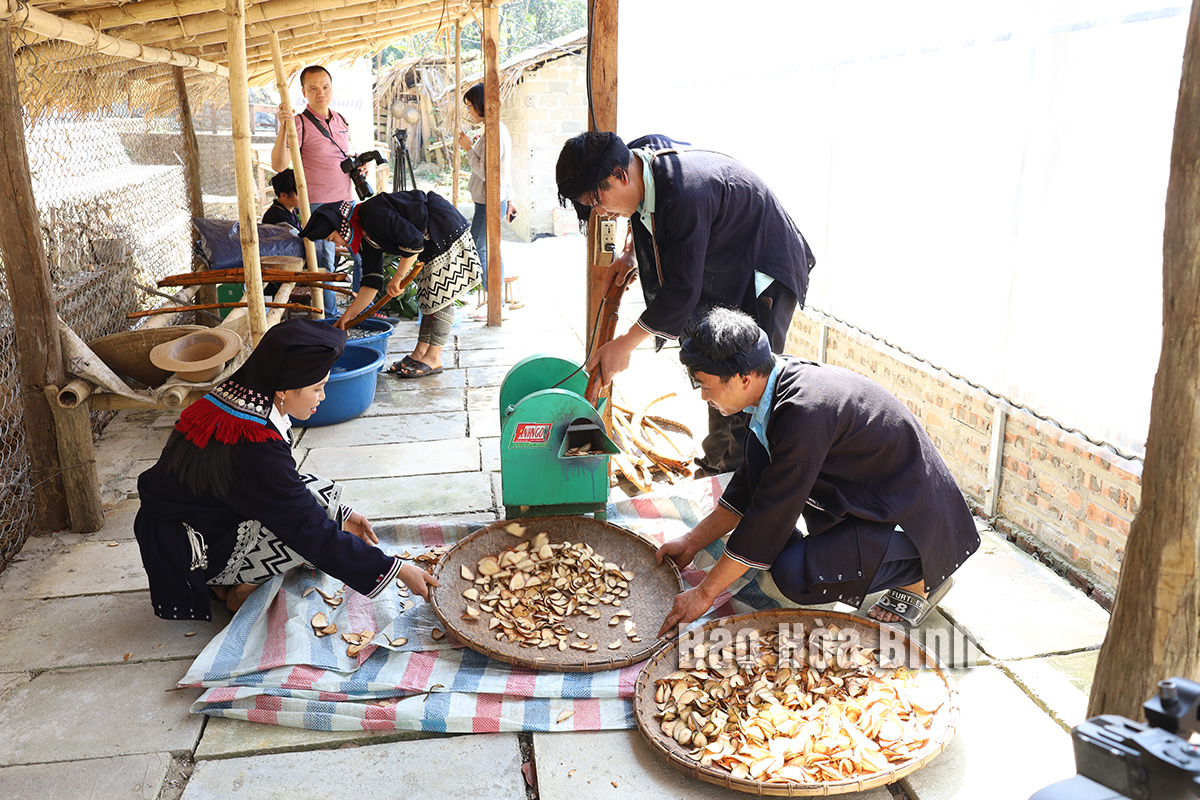



One standout rural tourism product attracting visitors is the herbal medicine trade group in Sung village, Cao Son commune (Da Bac), which offers a fascinating experience for tourists.
When the concept of community-based tourism (CBT) first began in Sung village, Cao Son commune (Da Bac), it was primarily known to tourists for its untouched landscapes and the largely preserved customs and traditions of Dao ethnic group. Through a capacity-building project for ethnic minorities, which is supported by a non-governmental organization, Sung Village has diversified its rural tourism offerings. It has established the production groups for brocade, herbal medicine, and Do paper to meet tourists’ interest in exploring the local culture and traditions. Ms. Ly Thi Nhat, the leader of the brocade group, says: "The formation of these craft groups not only helps us showcase and promote our resources and create the attractive new tourism products, but it also provides the sustainable livelihoods for the community”. Currently, the products such as herbal balms, mosquito sprays, and brocade scarves and bags have become popular souvenirs among tourists.
Located at the heart of the tourism area within Hoa Binh Lake, Ngoi village in Suoi Hoa commune (Tan Lac) boasts the stunning landscapes and it is the home of 100% of Muong ethnic households. Previously, the villagers relied mainly on fishing for their livelihood, now tourism is gradually developing, linked with fish farming. The CBT activities in the village receive the support from Hoa Binh Tourism JSC. Through the various promotional channels, tourists from near and far come to experience and explore Muong culture. Visitors are particularly drawn to the local cuisine, including fish and shrimp raised by the villagers themselves, as well as the tours of fish cages featuring specialty fish like catfish and grass carp, or participating in the traditional fishing methods.
According to the statistics, the province has over 20 community-based tourism villages of Muong, Thai, Dao, and Mong ethnic groups, with nearly 200 homestays offering accommodation and other services. These villages attract numerous domestic and international tourists for visits and cultural experiences. Among the types of rural tourism being developed in the province, CBT has received the most attention and investment. The notable examples include the cooperative-run CBT model in Lac and Hang Kia villages (Mai Châu), the association-run CBT model in Mu, Khuong, Mon, and Sat Thuong hamlets (Lac Son), and the joint-stock company CBT model in Ke, Da Bia and Sung hamlets (Da Bac). There is also a business-linked CBT model in Ai hamlet, Phong Phu commune (Tan Lac), where profits are shared with the local households.
In the province, five community-based tourism villages are being recognized as 3-4 star OCOP standards, and one village has earned the title of ASEAN CBT. In addition, there are farms and agricultural production areas in the province supplying products for tourists, such as organic vegetables in Tan Lac, Cao Phong oranges, Lac Thuy chicken, and cage-farmed fish from Hoa Binh Lake. Some farms have also started offering rest and educational experiences, such as Dong Goi Manor, Happy Farm (Luong Son), and the cattle-raising and eco-education farm in Hoa Binh City, along with An Lac Eco Farm Hot Springs (Kim Boi). Several districts have established the cultural tourism tours tied to the agricultural experiences and traditional craft villages.
Mr. Bui Xuan Truong, the Deputy Director of the Department of Culture, Sports, and Tourism, states: "In recent years, the province has vigorously promoted the rural tourism development. Many unique and high-quality tourism products showcasing the rural ecological culture have been systematically and strategically developed, meeting the growing demand for tourist visits and experiences”. In addition to contributing positively to tourism revenue and the National Target Program for the New Rural Development, the rural tourism development faces some challenges, such as insufficient infrastructure. There are few centers or points for displaying and selling agricultural products, specialties, or traditional handicrafts that meet the needs of tourists. OCOP products and tourism services also lack the competitive edge, and tourism in many areas remains spontaneous and lacks proper planning.
In line with the National Target Program for New Rural Development in 2024 and the following years, the province will continue to support the rural tourism development. This includes focusing on training and capacity-building for the workforce, applying technology, accelerating digital transformation, and enhancing cross-sector and international cooperation in developing the rural tourism. The province will also promote the agricultural production, create region-specific OCOP products, and develop the value chains linked to the experiential and ecological tourism.